I haven’t always been a farmer. Far from it, actually. Throughout my 20s, I was actually a resident of big cities like Los Angeles and Chicago. Despite my agricultural upbringing, I went through a period of my life where I was easily swayed by food marketing, as are many people who are far removed from farming and confused by all the labels.
That being said, I have a confession to make: I used to be the girl who only shopped at Whole Foods and only bought organic.
Now, if someone wants to buy organic food, that is totally their decision. And if a farmer wants to grown organic, good for them! It isn’t easy nor cheap to get certified, and there is certainly a demand for organic products. More power to the farmer who chooses this route because all farmers deserve our respect — we need all kinds to feed the upcoming population of 9 billion people.
The problem lies in this: Organic food corporations spend billions of dollars a year by lying to you.
Yes, you heard that right. They point blank lie.
While acting like the “little guy” fighting against “big, bad ag” and corporate greed, why do they fail to mention that these campaigns to fight against conventional ag, “factory” farming, and GMOs are also run by multi-billion dollar corporations? “Organic” and “natural” is a $350 billion industry, so don’t think for one second that there isn’t some corruption, political agendas, and billions of dollars being used to influence consumers, corporations, and policy makers. Please check out this article I wrote last year called “The fat lies and fatter wallets of anti-GMO lobbyists” to see how the organic industry spends several billion dollars a year through 330 different organizations leading with fear as an industry to sell their products. Fear sells, and they know it.
These images come from an organic meat company:
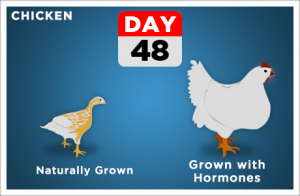
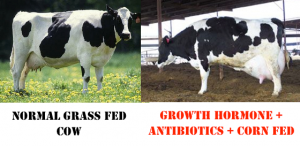
Ahhhh yes. The ol’ “pump animals full of hormones” trick. The problem here is that there’s actually no such thing as added hormones or steroids in poultry (or pork!) so this point is irrelevant because it doesn’t even exist. Can food companies stop labeling their chickens as “no added hormones or steroids” please? That’s like saying: Buy our product, we obey the law. Big deal.
Also, growth hormones are (sometimes) used in beef, not dairy cows. Think about it for a minute: dairy cows are used for breeding and milk, not beef. Why would you want to fatten up a cow for pregnancy? You wouldn’t. rBST is a hormone that is rarely given to cows to help them produce more milk, but it is the same as a hormone they already have and the milk is nutritionally equivalent. As I’ve mentioned before, it is perfectly OK to feed corn to cows.
But what about antibiotics?
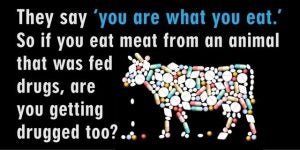
As of Jan. 1 of this year, a vast majority of antibiotics are no longer allowed in livestock unless absolutely medically necessary — in which case you need a vet’s prescription. If antibiotics are used, the animal must go through a withdrawal period before they can legally go to market which means that all meat and dairy products are antibiotic free. No, you aren’t eating drugs by eating meat.
OK … but there has to be benefits like no chemical pesticides, right?
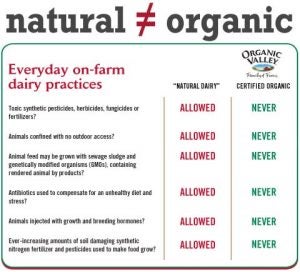
WRONG. Organic valley, really? Using ugly adjectives like “toxic, confined, injected, unhealthy, etc.” Fear sells, but that doesn’t make it right. Yes, organic livestock can be raised indoors with no space requirements, and there are hundreds of chemicals and pesticides approved for organic farming. Just because their competitor doesn’t have fancy labels, that doesn’t mean that it was raised improperly. Caring for livestock is any producer’s top priority — their business depends on their health and well being. Pumping animals with hormones, antibiotics, dousing crops with pesticides, etc. — all of these products cost the farmer MONEY. Doing this would quickly make them go broke. Perfect example right here:

Last I checked, apples and carrots are pretty gosh darn cheap to buy in the store. Thirty and 50 chemicals? While hiding the fact that organic farmers use chemicals, too? Give me a break. If anyone believes it takes 50 chemicals to grow an apple, I have an oceanfront property in Kansas to sell you. And I’ll need the money … to donate to the farmer who just lost his farm by growing broke spraying his fields with 30 to 50 chemicals everyday.
OK, OK…. but what about the soil and the environment?
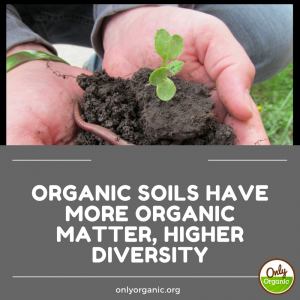
Making a broad, sweeping generalization is usually a red flag. The bottom line is soil health boils down to farm management, not label. Any farmer can practice soil health principles — conservation efforts like cover crops, crop rotation, and no-till farming. Soil is living. You can’t have good yields if you don’t have good soil, and farmers understand this. Healthy soils = less inputs = saving money = better yields = more money. Common sense, Business 101.
Appealing to nature is also a sweet and wholesome way to line the pockets of food corporations with an agenda to sell. (*cough*cough*Non-GMO project*cough*19 billion dollars*cough*) The word “GMO” conjures up scary images of weird mutations of creepy unknowns that we shouldn’t put in our body, however, everything we eat has had their genes modified by humans, including organics. Couple that with the fact that they conjure up creepy images like this to go with it, and you have glorified sales of mad science conspiracy theories injecting our food with fish or tomatoes or toxins or Frankensteins or something! Mwa-ha-ha-ha-ha!!!
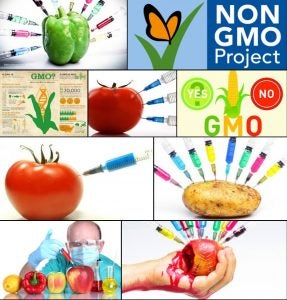
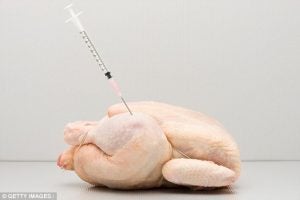
(P.S. There’s no such thing as a GMO chicken.)
Hazmat suits! Gas masks! Injections! Modifications! Chemicals!
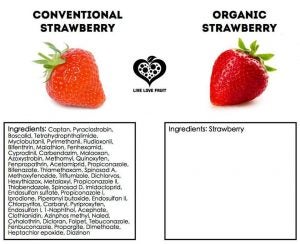
What??? Oh look, I can do that too:
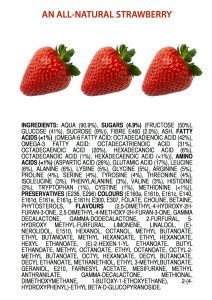
It’s organic! Everything is made of chemicals, but at one point in my life I was duped like many other well-intentioned folks. I fell victim to the lies and spent way too much money on food, based purely on misinformation. Is it right to lie to people? How is this ethical when you have to scare the ever-living daylights out of people to sell your product?
The war on food will never be over. But please — the next time you’re thinking about shelling out three times the price for food (#FirstWorldProblems), don’t forget to ask the people who devote their entires lives and careers to keeping your food safe. Farmers are generally great people, regardless of size or label and we are tired of the confusion surrounding our careers. The farmers, scientists, food auditors, inspectors, ranchers, veterinarians, and more are real people. Do some fact checking and make sure you’re buying foods based on science and facts, not hyperbole and fear.
Michelle Miller, the Farm Babe, is an Iowa-based farmer, public speaker and writer, who lives and works with her boyfriend on their farm which consists of row crops, beef cattle, and sheep. She believes education is key in bridging the gap between farmers and consumers.



